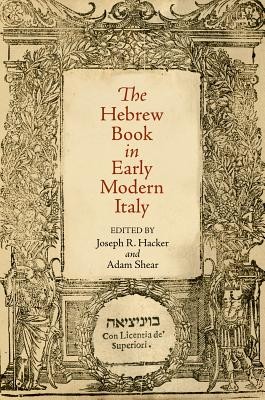
- We will send in 10–14 business days.
- Publisher: University of Pennsylvania Press
- ISBN-10: 0812243528
- ISBN-13: 9780812243529
- Format: 15.2 x 22.9 x 3.6 cm, hardcover
- Language: English
- SAVE -10% with code: EXTRA
The Hebrew Book in Early Modern Italy (e-book) (used book) | bookbook.eu
Reviews
Description
The rise of printing had major effects on culture and society in the early modern period, and the presence of this new technology--and the relatively rapid embrace of it among early modern Jews--certainly had an effect on many aspects of Jewish culture. One major change that print seems to have brought to the Jewish communities of Christian Europe, particularly in Italy, was greater interaction between Jews and Christians in the production and dissemination of books.
Starting in the early sixteenth century, the locus of production for Jewish books in many places in Italy was in Christian-owned print shops, with Jews and Christians collaborating on the editorial and technical processes of book production. As this Jewish-Christian collaboration often took place under conditions of control by Christians (for example, the involvement of Christian typesetters and printers, expurgation and censorship of Hebrew texts, and state control of Hebrew printing), its study opens up an important set of questions about the role that Christians played in shaping Jewish culture.
Presenting new research by an international group of scholars, this book represents a step toward a fuller understanding of Jewish book history. Individual essays focus on a range of issues related to the production and dissemination of Hebrew books as well as their audiences. Topics include the activities of scribes and printers, the creation of new types of literature and the transformation of canonical works in the era of print, the external and internal censorship of Hebrew books, and the reading interests of Jews. An introduction summarizes the state of scholarship in the field and offers an overview of the transition from manuscript to print in this period.
EXTRA 10 % discount with code: EXTRA
The promotion ends in 16d.16:16:42
The discount code is valid when purchasing from 10 €. Discounts do not stack.
- Publisher: University of Pennsylvania Press
- ISBN-10: 0812243528
- ISBN-13: 9780812243529
- Format: 15.2 x 22.9 x 3.6 cm, hardcover
- Language: English English
The rise of printing had major effects on culture and society in the early modern period, and the presence of this new technology--and the relatively rapid embrace of it among early modern Jews--certainly had an effect on many aspects of Jewish culture. One major change that print seems to have brought to the Jewish communities of Christian Europe, particularly in Italy, was greater interaction between Jews and Christians in the production and dissemination of books.
Starting in the early sixteenth century, the locus of production for Jewish books in many places in Italy was in Christian-owned print shops, with Jews and Christians collaborating on the editorial and technical processes of book production. As this Jewish-Christian collaboration often took place under conditions of control by Christians (for example, the involvement of Christian typesetters and printers, expurgation and censorship of Hebrew texts, and state control of Hebrew printing), its study opens up an important set of questions about the role that Christians played in shaping Jewish culture.
Presenting new research by an international group of scholars, this book represents a step toward a fuller understanding of Jewish book history. Individual essays focus on a range of issues related to the production and dissemination of Hebrew books as well as their audiences. Topics include the activities of scribes and printers, the creation of new types of literature and the transformation of canonical works in the era of print, the external and internal censorship of Hebrew books, and the reading interests of Jews. An introduction summarizes the state of scholarship in the field and offers an overview of the transition from manuscript to print in this period.


Reviews